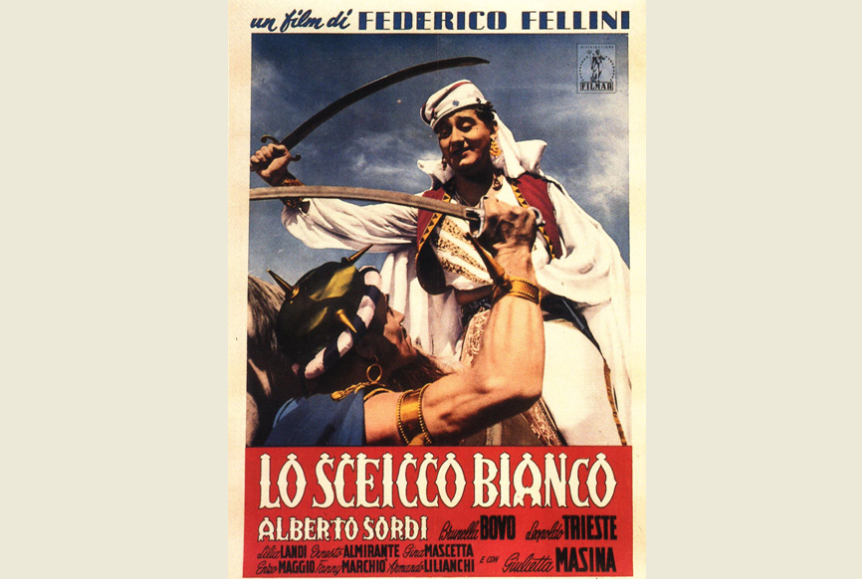- Sun 12 November 2023
Cinema at Breakfast – “Lo Sceicco Bianco”
Cinema La Gran Guardia
Sunday, November 12, 2023
Cinema for Breakfast is organized by the Centro Studi Commedia all’italiana, 50+ University of Livorno, FiPiLi Horror Festival, Circolo KInoglaz, and Erasmo Libri, with the co-participation of the Livorno Municipality.
Opening hours: Sunday morning (9.15 breakfast – 10.30 film screening).
Admission ticket: 8 euros, including breakfast.
Info: cinemaacolazione@gmail.com – online ticket pre-sale: https://biglietti.cinemaacolazione.it
Still a large audience, 165 spectators, after the 141 of the first screened film, for the second appointment, last Sunday (Night of the Living Dead by Romero), with CINEMA FOR BREAKFAST Season 2, film series curated by the Center for the Study of Italian Comedy, 50&Più University of Livorno, FiPiLi Horror Festival, Kinoglaz Circle and Erasmo Libri, with the co-participation of the Municipality of Livorno.
And Sunday, November 12th, for Opere Primee, at 10.30 am (after breakfast at 9.15 am) at Cinema La Gran Guardia it will be the turn of the film THE WHITE SHEIK by Federico Fellini (Italy 1952 – 1h26m). The film will be introduced by Chiara Tognolotti, associate professor at the Department of Civilizations and Knowledge Forms at the University of Pisa, where she teaches Aesthetics of Cinema and History of Italian Cinema.
The film has been restored by the Bologna Film Library as part of the Fellini 100 project, in collaboration with RTI-Mediaset and Infinity at the L’Immagine Ritrovata laboratory.
A newlywed couple traveling from the province to the capital of Rome. The appearance on the swing of the white sheik Alberto Sordi, a divine star only in the pages of photo novels.
And then the illusions of the world of entertainment. The benevolent prostitutes of the capital, including Giulietta Masina’s Cabiria. The entire Fellinian world is already present in this first film solely directed by the director from Rimini (Variety Lights is co-directed with Lattuada). “For the screenplay, I referred to the stories I had written for ‘Marc’Aurelio,’ which reflected my thoughts on the ruthless nature of love stories, on youthful love confronting bittersweet reality, on the honeymoon that goes sour, on the disappointments of the early days of marriage and on the impossibility of preserving the romantic initial dreams” (Federico Fellini).
Federico Fellini (Rimini, January 20, 1920 – Rome, October 31, 1993) was an Italian film director, screenwriter, comic book artist, and writer. Considered one of the greatest directors in the history of cinema, he was active for forty years, from 1950 to 1990, making nineteen films in which he “portrayed” a small crowd of memorable characters. He defined himself as “a craftsman who has nothing to say, but knows how to say it.” He left works rich in satire and veiled with a subtle melancholy, characterized by a dreamlike and visionary style. The titles of his most famous films – I Vitelloni, La Strada, Le Notti di Cabiria, La Dolce Vita, 8½, and Amarcord – have become quoted topoi in the original language around the world. His films La Strada, Le Notti di Cabiria, 8½, and Amarcord won the Academy Award for Best Foreign Language Film. Nominated twelve times for the Academy Awards, he was awarded the Honorary Academy Award in 1993. He also won the Moscow International Film Festival twice (1963 and 1987), the Palme d’Or at the Cannes Film Festival in 1960, and the Honorary Golden Lion at the Venice Film Festival in 1985.
Chiara Tognolotti, associate professor at the Department of Civilizations and Knowledge Forms at the University of Pisa, where she teaches Aesthetics of Cinema and History of Italian Cinema. She studies French cinema from the silent and classical period and modern Italian cinema from a historical-theoretical perspective with a particular focus on gender studies. Among her recent works are the monographs The Fall of the House of Usher (Jean Epstein, 1928); Photogenie, Surfaces, Metamorphosis (Mimesis 2020); From the Photogenie of Reality to the Theory of a Cinema Beyond Reality: The Archipelago Jean Epstein (Kaplan 2020, with Laura Vichi), and the edited volumes Cinderella, Galatea, and Pygmalion. Narrating Female Stardom in Cinema Between Fairy Tale and Myth (Edizioni ETS 2020) and The Beauty of Things. The Thought and Practice of Louis Delluc’s Cinema (Edizioni ETS 2022). She is part of the research network FAScinA – Forum of Women Scholars in Cinema and Audiovisual Studies.


Subscribe to the newsletter to stay updated
Don't miss any news about events in Livorno and surroundings.


